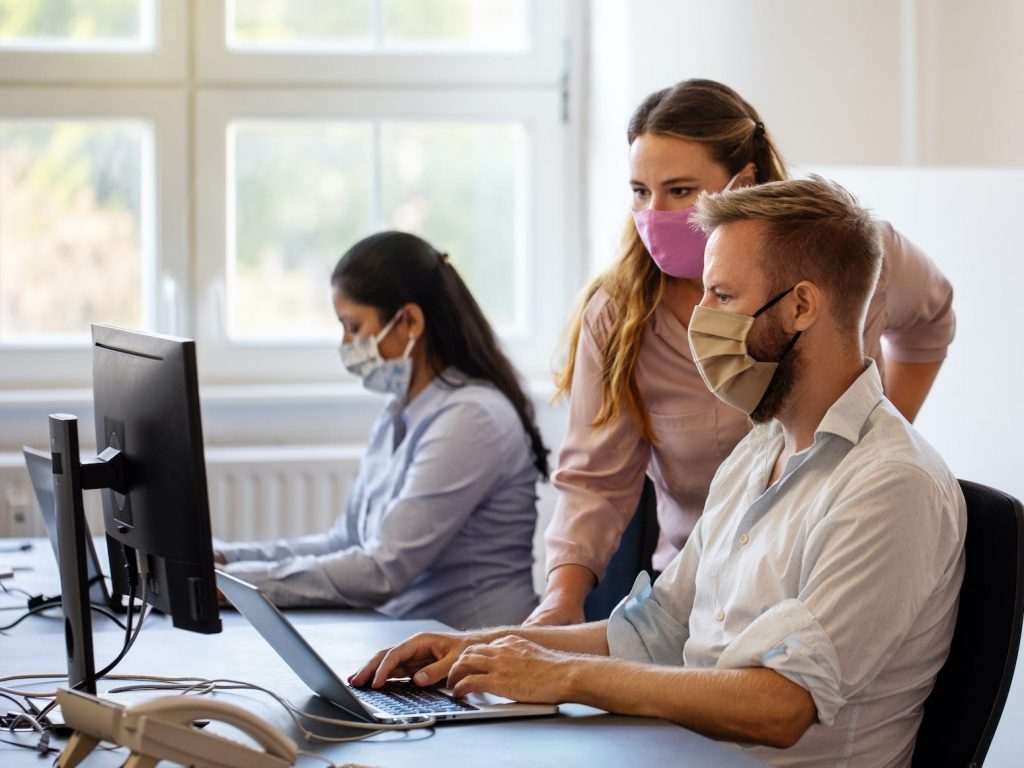
- A new Gallup poll asked employed US adults whether there should be a vaccine mandate at their work.
- Fifty-two percent of respondents favor or strongly favor this, while 38% are opposed or strongly opposed.
- It can be challenging for some workers, especially in service jobs, to take time off to get vaccinated.
- See more stories on Insider's business page.
While companies are figuring out whether they should require workers to get vaccinated and what exactly is the plan for employees returning to the office, a new poll found that over half of workers are in favor of their work requiring all employees get the jab.
A Gallup poll of over 1,800 employed US adults found that 16% are in favor and 36% are in strong favor of their employer requiring coronavirus vaccinations for all workers except for those who are medically exempt.
On the other hand, 9% are opposed to it and 29% are strongly opposed.
The share who strongly favor this has gone up slightly, from 29% in May 2021 and 33% in June 2021. Those who are strongly opposed has only gone down slightly, from 31% in May and 30% in June.
Gallup notes that this poll taken between July 19 and July 26 is before new CDC guidance following the spread of the Delta variant, including a recommendation for fully vaccinated people to wear masks indoors in "substantial or high transmission" places. Nine percent said their employer had a vaccine requirement and 62% encouraged it.
"This guidance has led to several prominent companies delaying back-to-work plans, requiring employees to be vaccinated or requiring employees to wear face masks at work," Gallup wrote. Many companies have already issued vaccine mandates for some or all employees. This includes Microsoft, Google, and United Airlines.
Americans not currently working but on the job hunt may also need to be vaccinated for their desired new position. Per reporting from Insider's Juliana Kaplan, Indeed job posting data for the week ending August 7 shows more are mentioning a requirement. The share of job postings per million that noted specifically a coronavirus vaccination was up 34% from a month earlier. However, the share of job postings with this requirement is still small.
It can be difficult for some workers to take time away from work to get the shot or to recover from side effects
In the US, 72.3% of adults as of August 19 have received at least one dose of the vaccine and 61.9% are fully vaccinated. Employees aren't opposed to receiving cash and other incentives for getting the shot.
In a June poll of employed US adults, Gallup found 24% of those not vaccinated against coronavirus indicated a "payroll bonus or other direct cash incentive for receiving COVID-19 vaccination" would make them more likely to get the shot, followed by 21% who said time off for vaccine side effects would.
Amazon, which has held on-site vaccination events but doesn't require coronavirus vaccinations, is one company offering an incentive. It has a contest giving out up to 18 prizes, including two $500,000 cash prizes for the company's frontline employees who are vaccinated.
But stepping away from work may be tough for some workers. As Insider's Juliana Kaplan reported, Harvard's Shift Project found that around half of service workers in a survey were not vaccinated as of June 2021. Additionally, many of the 78% who haven't tried to schedule a time to get vaccinated said it's because they're worried about side effects.
The survey found higher shares of respondents were vaccinated if they have time off to recover from side effects or to get the shot than the share who had no employer support.
"I think it's something that more advantaged workers take for granted," Kristen Harknett, a professor at University of California, San Francisco and one of the report's authors, told Kaplan. "If I spike a fever the day after I get my second vaccine, I know that I have the flexibility to shift my work or to take a paid day off. Most of these service sector workers don't have that luxury."

